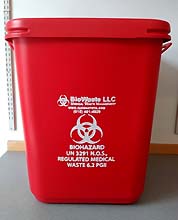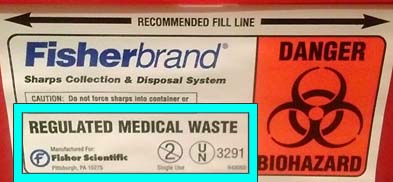print version of this document
Who you should contact for assistance with your biohazardous waste pickup needs:
Contact Plant Operations' SIS if/when:
- You need to schedule an “upon request” pickup.
- Supplies of containers/lids/bags are running low or
- You need extra containers for a project like a freezer clean out
- You have issues directly related to the bio-waste pickup service
- Provide the following information when calling SIS: contact name/number, research group name, physical pickup location:
3-WORK (3-9675) or 4-WORK (4-9675) - on campus only
615-343-9675 - off campus
Contact OCRS Biosafety if/when:
- You need advice/assistance regarding the collection and disposal of any biohazardous waste.
- You have training questions related to DOT regulated medical waste.
- There are spills or exposures involving bio-waste or biological materials.
biosafety@vumc.org or 615-322-2057
Contact your department’s or institute’s designated representative if/when:
- Service-related issues are not being effectively addressed through prior communications with Plant Operations’ SIS;
- Waste pickup does not occur on a regularly scheduled pickup day;
- A new lab or pickup location needs to be added or a current pickup location needs changed or removed from the schedule;
- A lab’s pickup frequency or scheduled day needs to be permanently changed.
- Mass Spectrometry Contact: Amanda Renick-Beech 615-343-9207
- CBD and the VBI Contact: Anuj Rastogi 618-303-7503 (cell) or 615-343-6863 (office)
- Center for Structural Biology Contact: Arina Hadziselimovic 615-936-5686
- Arts & Sciences Contact: Aaron Covey 615-343-6545
Tip 1: Have an authorized signer available during your lab’s scheduled pickup time.
The BioWaste LLC representative must collect a signature on the shipping manifest before they can remove your biohazardous waste. Only personnel who have successfully completed the DOT training for regulated medical waste should be signing. Whenever possible, plan to have a trained, authorized signer available in the lab during the regularly scheduled pickup time so your waste is not missed.
A current list of trained lab personnel who are authorized to sign for RMW pickups will be provided to BioWaste LLC. If you need to update that list due to changes in personnel, please contact Richard DiTullio (richard.ditullio@vumc.org) with the needed updates.

TIP 2: Acceptance criteria for incoming BioWaste LLC containers
The BioWaste LLC representative should be providing you with the rectangular red model of shipping container shown here. Verify that all containers are in good condition before accepting them. If you see any of the following conditions, retrieve a new container from the autoclave rooms and report the problem to your department ‘s contact:
- Visible cracks in container wall or bottom
- Dirty containers or lids
- Containers lacking at least one legible biohazard symbol/marking
TIP 3: Disposal of sharps containers
 Sharps containers must be labeled with the minimum information required by the DOT in order to qualify as a “stand-alone” RMW shipping container (see text and symbols in blue box).
Sharps containers must be labeled with the minimum information required by the DOT in order to qualify as a “stand-alone” RMW shipping container (see text and symbols in blue box).BioWaste LLC will accept sharps containers that are properly closed for disposal.
- Smaller, benchtop sharps container can fit inside your BioWaste LLC container. Simply place the permanently closed sharps container inside the lined container like any other biohazardous waste.
- Larger, floor model sharps containers (typically 20 gallons or up) will not fit in the BioWaste LLC containers. But, they can be disposed of through this group if they have a DOT marking like shown to the right. To dispose of these containers:
- Verify that the lid is permanently closed and then reinforce it with packaging tape
- Place the container next to your BioWaste LLC containers that are packed and awaiting pickup.
*Note: If you have a large, floor model sharps container for disposal that does NOT have a DOT marking, please contact OCRS Biosafety (biosafety@vumc.org, 615-322-2057) for assistance.
Sharps containers must be labeled with the minimum information required by the DOT in order to qualify as a “stand-alone” RMW shipping container (see text and symbols in blue box).
TIP 4: Liquids in BioWaste LLC containers
Do not pour free-flowing liquids or place bottles with bulk liquids into the BioWaste LLC containers. Cell culture flasks, sample tubes and etc. that contain residual liquids are acceptable provided that they are closed. *Note: Bulk liquids should be treated with disinfectant and disposed of via a designated lab sink and the building’s sewer system as outlined in the OCRS Biohazardous Waste Disposal Guide.
TIP 5: Disposal of tissues, organs and carcasses, including research fish
Remember that vertebrate animal or human tissues/organs (other than incidental residues) used in research or teaching should not be disposed of in your lab’s BioWaste LLC container. Alternatives for disposal include:
- Animal tissues/organs used for IACUC-approved protocols can be disposed of through the Division of Animal Care’s (DAC) holding facility of origin.
- Fish carcasses should be disposed of in the OCRS freezers as detailed in the Research Fish Disposal Policy.
- Unused human tissues/organs obtained through a clinical area should be returned to the original clinical source, if possible.
- A member of the OCRS Biosafety team will help you coordinate the disposal of animal tissues/organs obtained via markets or slaughterhouses.
Contact OCRS Biosafety (biosafety@vumc.org, 615-322-2057) regarding tissue/organ waste disposal needs not specifically addressed here.
TIP 6: Disposal of research insects
Research insects, such as fruit flies or mosquitoes, can be placed in BioWaste LLC containers for final disposal. However, the insects must be rendered nonviable (i.e., freezing overnight) before placing in BioWaste LLC containers. Please see the Research Insect Disposal Policy for more information.